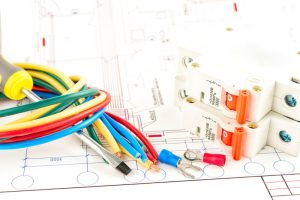 Each and every year, thousands of people die or are injured by unintentional CO (carbon monoxide) exposure or house fires. It’s a harsh statistic, but one that amplifies the importance of having properly installed smoke and CO detectors in your home. In fact, it’s the law that homes have these two devices in them when you move in, and illegal to tamper with these devices in most jurisdictions too.
Each and every year, thousands of people die or are injured by unintentional CO (carbon monoxide) exposure or house fires. It’s a harsh statistic, but one that amplifies the importance of having properly installed smoke and CO detectors in your home. In fact, it’s the law that homes have these two devices in them when you move in, and illegal to tamper with these devices in most jurisdictions too.
Of course, you probably have them both up in your home, and your batteries are likely fresh (are you changing them every 6 months?) But what if there was an extra precautionary step you could take?
Well, there is! You can have your CO and smoke detectors hardwired into your electrical system. Read on as we uncover not only the importance of these systems, but also why you should consider hardwiring yours.

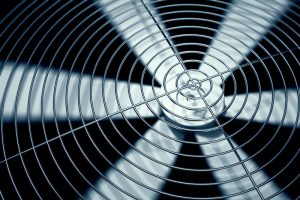 When summer temperatures are at their peak, there is only so much you can do to keep your house as cool as possible. You can keep your air conditioner well-maintained, keep the blinds on south-facing windows closed during the day, make sure you’re well equipped with the right indoor air quality products, and invest in a solar attic fan!
When summer temperatures are at their peak, there is only so much you can do to keep your house as cool as possible. You can keep your air conditioner well-maintained, keep the blinds on south-facing windows closed during the day, make sure you’re well equipped with the right indoor air quality products, and invest in a solar attic fan!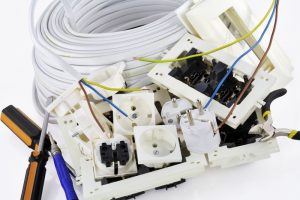 Of all the issues that can impact various areas of your home, electrical problems can be the most dangerous. A plumbing problem can inflict a lot of water damage, but an electrical problem can potentially cause house fires or electrocution. It’s essential that you have a professional electrician check the wiring in your home at least once every few years. Otherwise, you’re substantially increasing the likelihood that a problem will occur.
Of all the issues that can impact various areas of your home, electrical problems can be the most dangerous. A plumbing problem can inflict a lot of water damage, but an electrical problem can potentially cause house fires or electrocution. It’s essential that you have a professional electrician check the wiring in your home at least once every few years. Otherwise, you’re substantially increasing the likelihood that a problem will occur.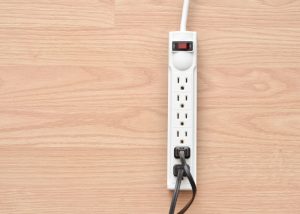 If your home is anything like the average American home, you have a lot more electrical equipment and appliances in it than ever before. You probably have multiple devices connected to your power supply and electrical grid at any given time, right? That’s great, but it’s important to know the best way to protect your appliances and power charging stations.
If your home is anything like the average American home, you have a lot more electrical equipment and appliances in it than ever before. You probably have multiple devices connected to your power supply and electrical grid at any given time, right? That’s great, but it’s important to know the best way to protect your appliances and power charging stations.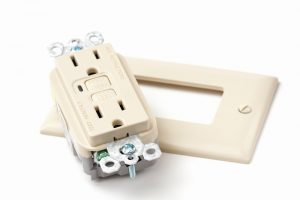 Your household’s electrical grid is easily one of the most important components in the living space. Each of your appliances requires this system to work—even gas-powered heaters use an electric starter. If your electrical system is malfunctioning, you can experience all kinds of problems.
Your household’s electrical grid is easily one of the most important components in the living space. Each of your appliances requires this system to work—even gas-powered heaters use an electric starter. If your electrical system is malfunctioning, you can experience all kinds of problems.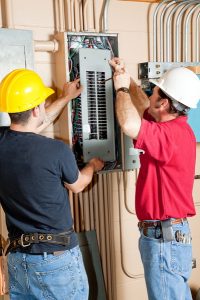 Also called the circuit breaker panel, the electrical panel of your home serves as the central hub for your entire electrical system. It’s where the incoming electricity is routed to the different circuits. The breakers are designed to shut off circuits in case of a voltage overload. If you have an aging circuit breaker panel, it’s wise to ensure you aren’t overdue for an upgrade, given the higher electrical demands we have all put on our homes in recent years.
Also called the circuit breaker panel, the electrical panel of your home serves as the central hub for your entire electrical system. It’s where the incoming electricity is routed to the different circuits. The breakers are designed to shut off circuits in case of a voltage overload. If you have an aging circuit breaker panel, it’s wise to ensure you aren’t overdue for an upgrade, given the higher electrical demands we have all put on our homes in recent years.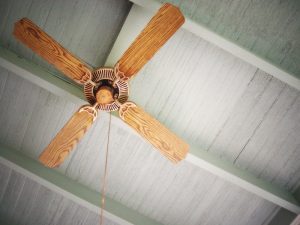 Ceiling fans don’t seem like that complicated of an appliance right? When you want your home to be cool, you turn your ceiling fans on, and that’s that, right?
Ceiling fans don’t seem like that complicated of an appliance right? When you want your home to be cool, you turn your ceiling fans on, and that’s that, right?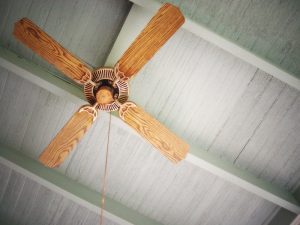 Ceiling fans are often talked about this time of year—and we’ll get to why we’re talking about them now later in this post—but something that a lot of homeowners don’t really realize is that celing fans do not actually cool the air in the room where they’re running.
Ceiling fans are often talked about this time of year—and we’ll get to why we’re talking about them now later in this post—but something that a lot of homeowners don’t really realize is that celing fans do not actually cool the air in the room where they’re running. Electricity is one of those home comforts that is pretty easy for any of us to take for granted nowadays. After all, we’ve had it available to us in our households throughout our entire lives—it’s always there! But… taking things for granted often means we can forget about the dangers involved if we don’t properly care for them. And electricity can certainly pose such a danger.
Electricity is one of those home comforts that is pretty easy for any of us to take for granted nowadays. After all, we’ve had it available to us in our households throughout our entire lives—it’s always there! But… taking things for granted often means we can forget about the dangers involved if we don’t properly care for them. And electricity can certainly pose such a danger.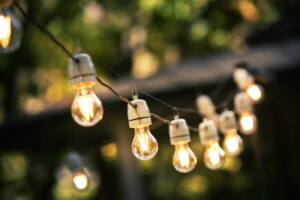 The holiday season is just about here, and if you’re like many homeowners in our area, you might be decorating your household, inside and out. Many times, this includes putting holiday lights up and around your home.
The holiday season is just about here, and if you’re like many homeowners in our area, you might be decorating your household, inside and out. Many times, this includes putting holiday lights up and around your home.